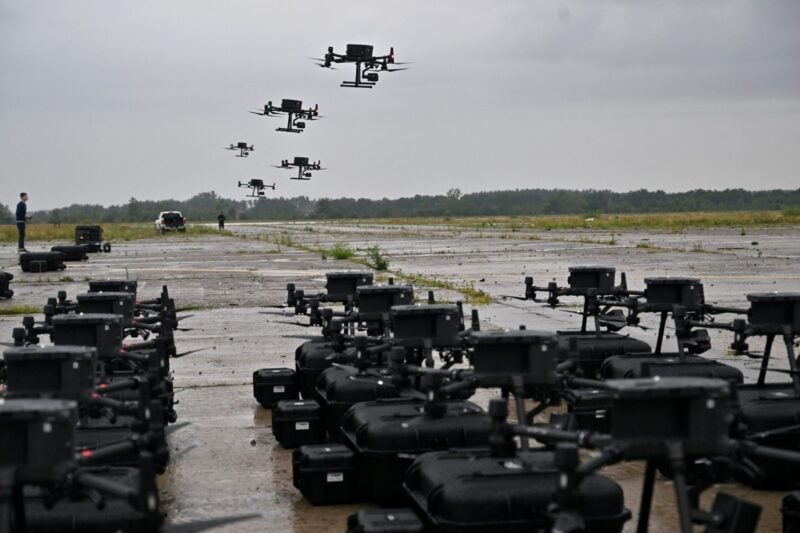
In an Atlantic Council public event on 6 September, Lt Gen S. Clinton Hinote, Deputy Chief of Staff for Strategy, Integration, and Requirements of the US Air Force, gave support to air denial as a doctrinal alternative to air supremacy.
“Typically, we think of superiority as a duality,” Hinote said. “We are going to use the space and we’re going to deny its use to others. The barriers to entry for denial, for denying the use of airspace, are much, much lower these days than the barriers to entry for extending control and keeping control of the airspace.”
“We want to get to the point where shooting a missile at something is more expensive than taking the missile shot,”
The war in Ukraine has given nowhere to hide for Russian planes and denying Russia access to the airspace has given succour to Ukrainian land forces. Traditional shoot-and-scoot S-300 mobile air defence measures have policed the blue skies of higher altitudes, while the air littoral in the lower altitudes – once a sanctuary for fighter jets beneath the level of radar detection – is, in this conflict, made precarious by a multitude of man-portable Stinger missiles and anti-aircraft fire.
“Ukraine has clearly denied air superiority and that has allowed them to stay in the fight. It’s really interesting to see how low that barrier to entry was,” said Hinote.
UAVs are democratising air power
Democratisation of air power has seen application in Ukraine, as well as material results. Once the preserve of advanced militaries, air power has become accessible to a wider range of nations through the proliferation of uncrewed aerial vehicles (UAVs) and autonomous drones. Where conventional air power has used millions of dollars over several years to train personnel capable of servicing and flying planes, UAV operators have created significant challenges in their airspace for a fraction of the cost and on a far shorter timescale.
Both Russian and Ukrainian forces are in a position of mutual air denial, where air support is largely confined to regions where friendly ground forces have control. “As a result of the mutual denial, Ukraine performed much better than expected, and Russia failed in many things it needed to do to take control of the battlefield,” said former Commander of the US European Command and Supreme Allied Commander Europe, Gen Philip Breedlove, USAF (ret.), speaking at the same event.
The potential for doctrinal change for the US Air Force is present. “It may well be that mutual denial is good, i.e., it deters our potential adversaries from moving against our friends,” said Hinote in discussion with Dr Kelly Grieco, resident senior fellow with the Atlantic Council’s New American Engagement Initiative.
“If that’s true,” continued Hinote, “then we need to have a military that can achieve mutual denial, even at the edges of the battle space, even on the doorstep of our adversaries.”
Structural changes under an air denial doctrine
The changes necessary for an air force pursuing air denial are far-reaching. “It probably looks like a change in the cost-benefit calculus, so we want to get to the point where shooting a missile at something is more expensive than taking the missile shot,” said Hinote.
“That’s the radical difference right there. Typically, we have been thinking about using air power in ways that involve very exquisite platforms and capabilities that are very expensive. A missile, or sets of missiles, or even a dozen missiles coming out are much cheaper than that one particular platform.”
Reflecting on the strategic position of the US, Hinote noted the benefits of mutual air denial in preserving the status quo, one where the US does not want to see China aggress against Taiwan or its neighbours, or for a resurgent Russia to attack a Nato ally.
Hinote is critical of models of extending airpower into another country that focus on approaching the centre of power. “What we have found in our war games is maybe that’s not what we need to do. That, politically, that’s not what we need to do,” he said.
Scale versus attrition
Grieco, who has written on the concept of air denial for the Atlantic Council together with Col Maximilian Bremer, was clear that there are still concerns about nature of warfare under mutual air denial. “If you are thinking about mutual air denial, that’s a continuous thing that you have to keep up,” he said. “There’s not sort of a decisive battle that takes place. It’s continuous, which means [tending] more towards attrition.”
“If it did,” responded Hinote, “we have to think about what we can scale. It seems really difficult to scale some of the more exquisite capabilities.
“It certainly looks like some sort of autonomous aircraft that are using the air littorals seem to be something that might scale…If so, then we’ve got to be able to lay the foundations for that – not only the technical foundations but the doctrinal and the organisational foundations – in case we do need to scale that in in a modern war of attrition.”




